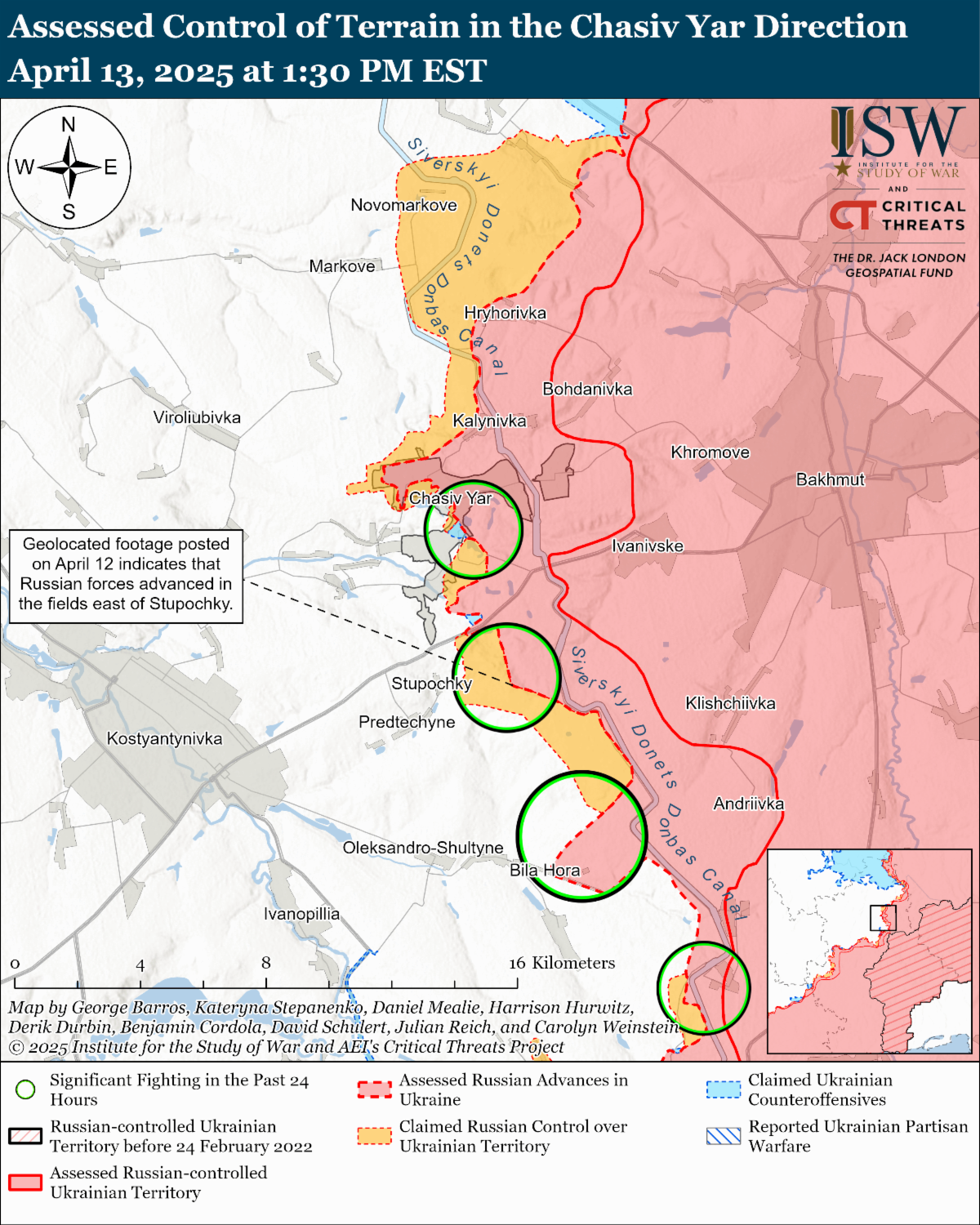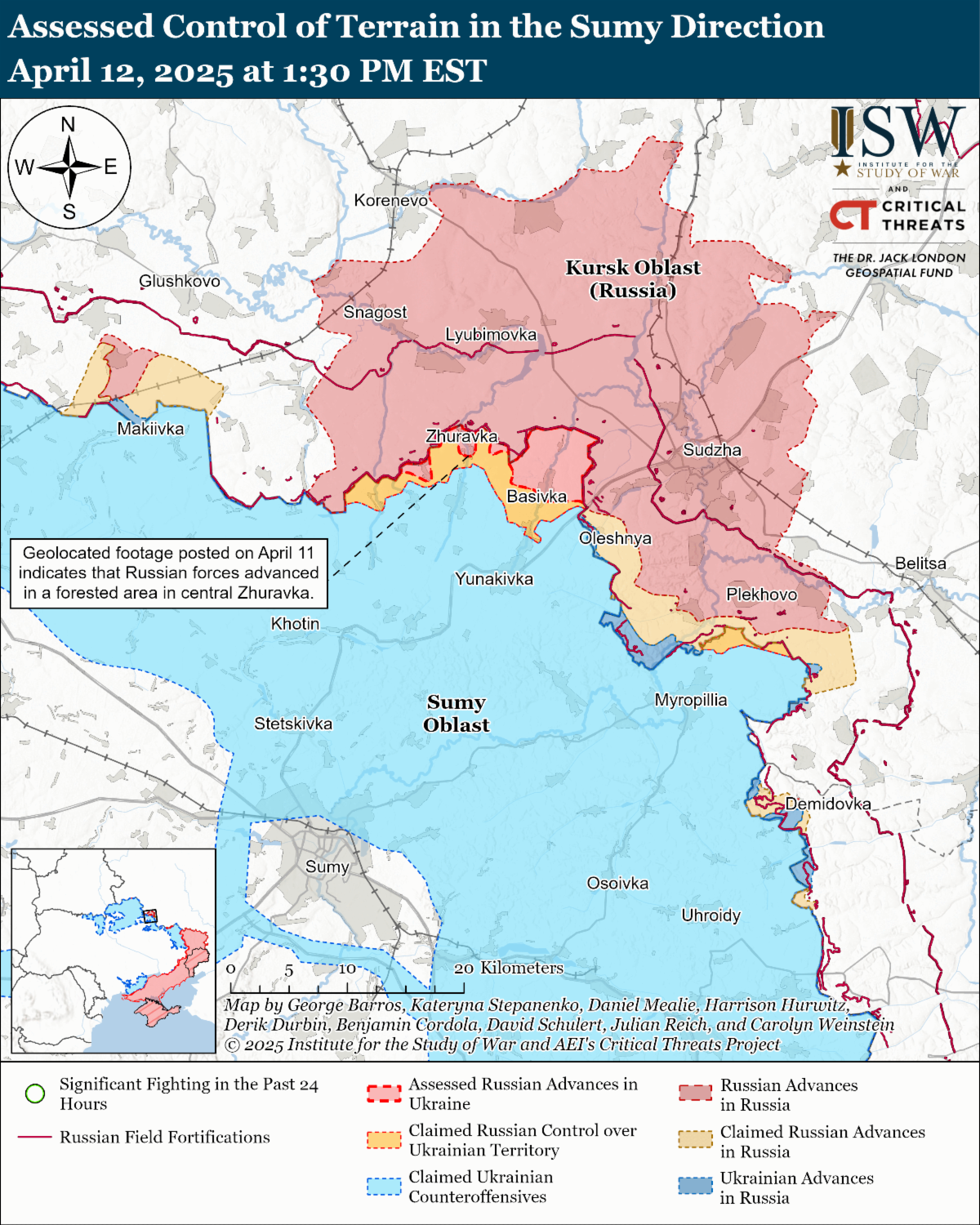Kremlin Spokesperson Dmitry Peskov said that ongoing US-Russian negotiations are unlikely to result in "lightning-fast results," contrary to US President Donald Trump's stated objective of achieving a general ceasefire and lasting peace agreement in Ukraine in the near future. Peskov told Kremlin journalist Pavel Zarubin on April 13 that "everything is moving very well" regarding US-Russian bilateral talks and discussions about the war in Ukraine but that there will likely not be immediate results. Russian Ministry of Foreign Affairs (MFA) Second Department of Commonwealth of Independent States (CIS) Director Alexei Polishchuk gave an interview to Russian state media group Rossiya Today (RT) and stated that Russia is willing to engage in negotiations that “take into account the modern realities” of the war and eliminate the “root causes” of Russia’s war in Ukraine. Russian officials have repeatedly claimed that any peace process in Ukraine must address these so-called “root causes." Russian Foreign Minister Sergey Lavrov previously defined "root causes" as NATO's alleged violation of obligations not to expand eastward and Ukraine's alleged discrimination against Russian-speaking minorities in Ukraine. These so-called ”root causes” are a reference to Russia’s pre-war demands that effectively amount to Ukraine’s full capitulation and the installation of a pro-Russian government in Ukraine. Peskov's and Polishchuk's comments also reflect the Kremlin's continued rejection of President Trump's stated approach of first establishing a ceasefire and then negotiating a broader peace agreement and the Kremlin's commitment to war aims that are incompatible with President Trump’s goal of achieving a lasting peace in Ukraine.
Any future general ceasefire or peace agreement must include robust monitoring mechanisms, given the Kremlin's ongoing efforts to portray Ukraine as violating the long-range energy infrastructure strikes ceasefire without providing evidence of these strikes and despite the lack of public details about the ceasefire’s terms. It remains unclear what monitoring mechanisms the West could leverage to enforce and monitor a future general ceasefire or if the Kremlin would accept any such mechanisms. Peskov and Polishchuk reiterated ongoing Russian claims on April 13 that Ukraine is violating the temporary moratorium on long-range strikes against energy infrastructure. Russian officials, led by the Russian Ministry of Defense (MoD), have accused Ukraine of violating the temporary ceasefire almost every day since March 29 but have not provided evidence to substantiate most of these claims. Russian officials have repeatedly claimed that Ukrainian forces are striking energy infrastructure along Ukraine's northern border with Russia, although it remains unclear if strikes with tactical first-person view (FPV) drones or routine shelling would be a violation of the energy infrastructure strikes ceasefire as the terms of the ceasefire are publicly unclear. Russian officials appear to be weaponizing the vague conditions of the ceasefire and exploiting the absence of independent monitoring mechanisms to flood the information space with unsubstantiated claims about supposed Ukrainian ceasefire violations.
Russian officials may attempt to flood the information space with unsubstantiated claims of Ukrainian ceasefire violations in the future if a general ceasefire does not include robust independent monitoring mechanisms. Russian forces may conduct false flag attacks along the frontline in the event of a future general ceasefire in order to accuse Ukraine of violating the ceasefire and justify reigniting the conflict. ISW has previously assessed that Russian President Vladimir Putin's claims that the current Ukrainian government is illegitimate are setting conditions to legitimize future Russian ceasefire violations. The Kremlin is weaponizing the lack of monitoring mechanisms for the temporary energy infrastructure strikes ceasefire, and any future general ceasefire must have more robust monitoring mechanisms to deter, adjudicate, or at least properly record future violations.
Key Takeaways:
- Kremlin Spokesperson Dmitry Peskov said that ongoing US-Russian negotiations are unlikely to result in "lightning-fast results," contrary to US President Donald Trump's stated objective of achieving a general ceasefire and lasting peace agreement in Ukraine in the near future.
- Any future general ceasefire or peace agreement must include robust monitoring mechanisms, given the Kremlin's ongoing efforts to portray Ukraine as violating the long-range energy infrastructure strikes ceasefire without providing evidence of these strikes and despite the lack of public details about the ceasefire’s terms. It remains unclear what monitoring mechanisms the West could leverage to enforce and monitor a future general ceasefire or if the Kremlin would accept any such mechanisms.
- Russian officials continue to weaponize the vague terms of the current ceasefire on long-range strikes against energy infrastructure and ongoing ceasefire negotiations in an effort to falsely portray Ukraine- and not Russia- as unwilling to engage in constructive dialogue.
- Russian forces conducted a devastating ballistic missile strike against Sumy City on April 13, causing more than 100 casualties.
- Ongoing milblogger complaints about the Russian military's conduct of the war in Ukraine reinforce ISW’s assessment that Russian tactics will degrade Russia’s manpower and materiel resources and contribute to slowing Russian advances along the frontline.
- Ukrainian forces recently advanced near Toretsk and Russian forces recently advanced near Kharkiv City, Borova, and Chasiv Yar.
| 





 [국방부] 2025년 각 군 별 장교/부사관 모집 일정 안내
[국방부] 2025년 각 군 별 장교/부사관 모집 일정 안내
 [ISW] 러시아의 공세 캠페인 평가, 2025년 4월 12일
[ISW] 러시아의 공세 캠페인 평가, 2025년 4월 12일